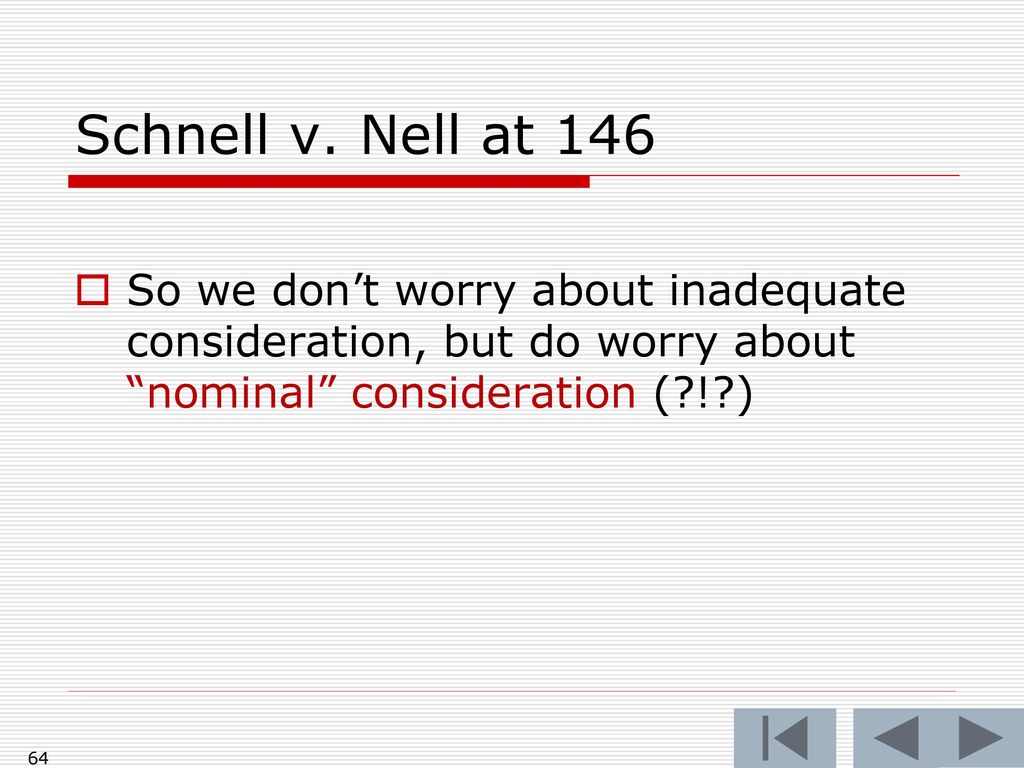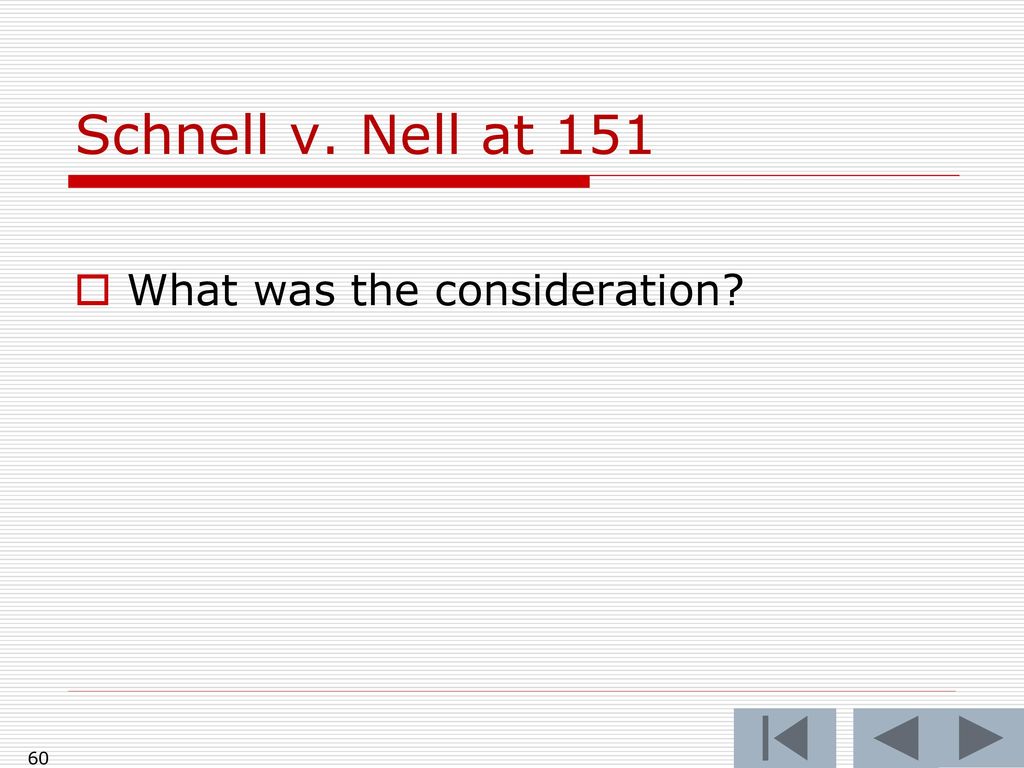Understanding Schnell V. Nell: A Legal Case Explained
Could a promise, even when meticulously documented, be rendered unenforceable by the stark realities of law and circumstance? This is the crux of the legal battle that unfolded in Indiana in 1861, a case that continues to resonate within the complexities of contract law.
The case, known as Schnell v. Nell, presents a fascinating study of consideration, a fundamental element in contract law. The facts, as presented in the court documents, are straightforward. Theresa Schnell, the wife of Zacharias Schnell, passed away, leaving behind a will. In that will, she bequeathed $200 each to three individuals: J.B. Nell, Wendelin Lorenz, and Donata Lorenz. However, there was a critical issue: Theresa Schnell owned no property at the time of the will or at her death, save for her legal interest in her husband's property. This placed Zacharias Schnell in a unique position. After his wife's death, he entered into an agreement with his heirs, including Nell, promising to pay the specified sums. This agreement, the subject of the legal dispute, was the focal point of the Indiana Supreme Court's deliberations.
The agreement between Schnell and the beneficiaries, drafted in 1856, clearly outlined his commitment: "$200 to the said J. Nell, $200 to the said Wendelin Lorenz, and $200 to the said Donata Lorenz." The payment schedule was also meticulously detailed, with installments spread over three years. The legal action initiated by Nell sought to enforce this agreement, claiming Schnell was contractually obligated to fulfill the promise made in the written document. The central question before the court was whether Schnell's promise, despite its clarity, was legally binding.
The core of the legal argument circled around the concept of "consideration." Consideration, in contract law, refers to something of value exchanged by each party to the contract. It is the "quid pro quo," the mutual exchange that makes an agreement enforceable. The plaintiffs argued that the promise of payment was valid. They pointed to the document, highlighting the formal agreement and Schnell's clear intention to pay the specified amounts. However, the defense questioned the existence of sufficient consideration to support Schnell's promise. They scrutinized what Schnell received in exchange for his commitment to pay.
The case brings to light the complex nature of contracts and the importance of considering elements of consideration in any contract, the court's decision hinged on the absence of such consideration. The court determined that the wife's will was unenforceable since she possessed no property to give. Schnell's promise to pay the bequests from her will was not supported by valid consideration because the will lacked legal weight. His agreement to pay the amounts was not, in the court's view, linked to any benefit or detriment arising from the agreement. The court found that Schnell was not obligated to fulfill the promise as his obligation was without consideration.
The Supreme Court of Indiana, in its ruling, highlighted a crucial legal principle: a promise is not enforceable if it is not supported by valid consideration. In Schnell v. Nell, the court examined the nature of the agreement. It determined that Schnell's promise to pay the amounts, stemming from his deceased wifes will, lacked valid consideration. The will was deemed unenforceable as the wife possessed no assets that she could legally bequeath to her heirs. The Court stated that Schnells promise was based on the moral obligation. However, moral obligations do not satisfy the legal requirements for consideration in a contract. Because of that, the court ruled that the agreement was not legally binding, and dismissed the suit. The case of Schnell v. Nell serves as a critical lesson that highlights the complexities of contract law. It also highlights the significance of the concept of consideration, and the fact that without it, even the clearest of promises could be deemed unenforceable.
- Dan Gillian At Boeing Leadership Career Highlights
- Best 6foot Reptile Enclosures Cages Find Yours Now
The case's historical context underscores the prevailing legal principles of the time. In 1861, contract law was still developing, and the rules of consideration were firmly established. The court's decision aligned with these principles, ensuring that contracts were based on an exchange of value. The decision was also a reflection of the prevailing social norms of the period. It underscored the importance of ownership rights and the legal limitations on what could be transferred through a will. The decision in Schnell v. Nell set a precedent for future contract disputes, reinforcing the need for a valid exchange.
The ramifications of Schnell v. Nell extend far beyond the confines of the Indiana Supreme Court's courtroom. The principles established in this case are still relevant today, influencing how contracts are drafted and enforced. The concept of consideration remains a cornerstone of contract law, and the case serves as a reminder of its importance.
The case is often cited in legal education, providing students with a practical example of how contract law works. It demonstrates the importance of considering all aspects of an agreement before entering into it. The enduring relevance of Schnell v. Nell emphasizes its position as a cornerstone of the legal profession.
The Schnell v. Nell case offers a compelling reminder of the complexity of contract law. It emphasizes the importance of clear understanding of the legal elements of a contract. The case serves as a valuable lesson for legal professionals and anyone dealing with contractual agreements.
| Case Details | Information |
|---|---|
| Case Name | Schnell v. Nell |
| Court | Supreme Court of Indiana |
| Year | 1861 |
| Citation | 17 Ind. 29 (1861) |
| Key Issue | Was the agreement between Schnell and the beneficiaries of his wife's will supported by valid consideration? |
| Holding | No, the agreement was not supported by valid consideration and was therefore unenforceable. |
| Relevant Legal Concepts | Consideration, Contract Law, Enforcement of Contracts |
| Facts Summary | Schnell agreed to pay beneficiaries from his deceased wife's will $200 each. The wife had no assets. |
| Reasoning | The court ruled Schnell's agreement lacked consideration. His wifes will was unenforceable since she owned no property. Schnell's promise was based on moral obligation, and this doesnt satisfy the legal definition of consideration. |
| Significance | Reinforces the need for valid consideration for contracts to be enforceable. |
| Reference | Justia.com |

George Mason School of Law ppt download

Schnell Nell 17 Ind. 29 (1861) Perkins, J. Action by J. B. Nell

George Mason School of Law ppt download